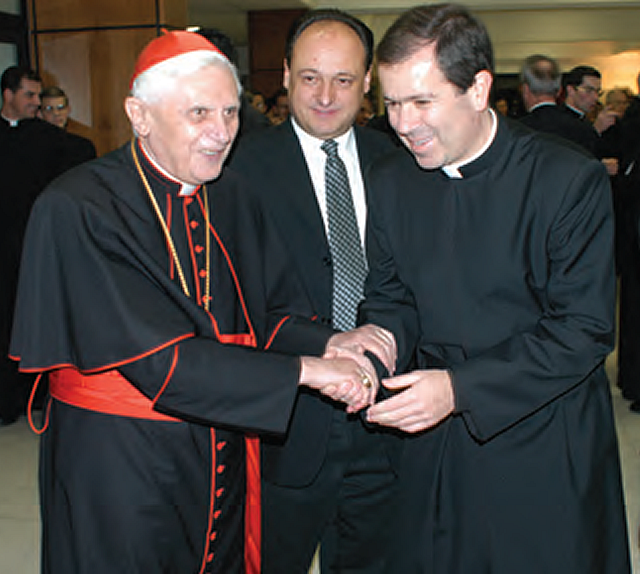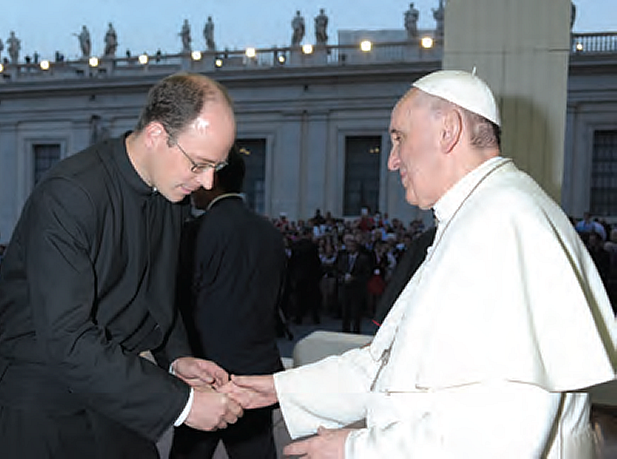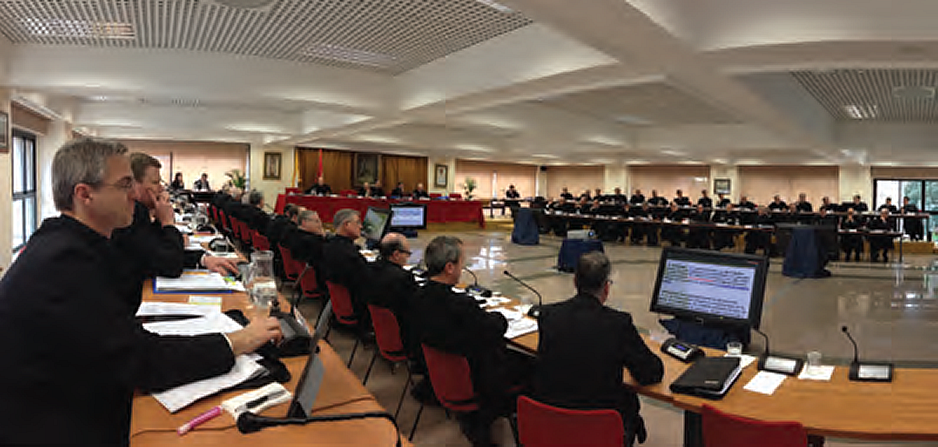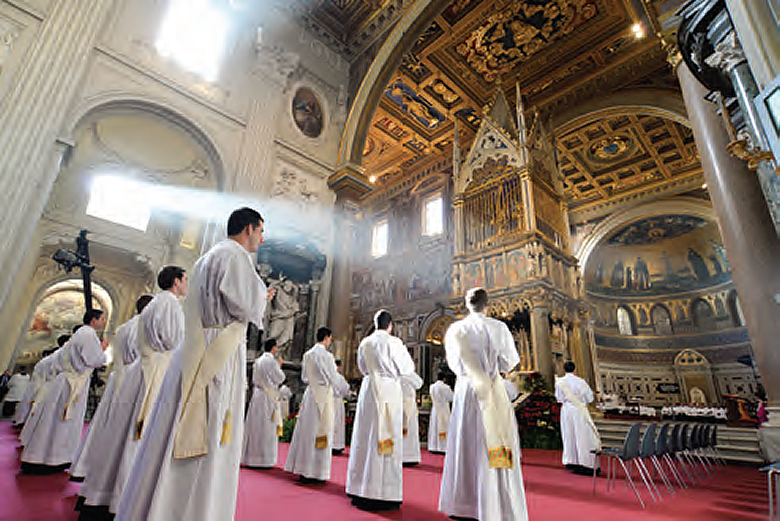Rome, June 1, 2004: Meeting between Cardinal Joseph Ratzinger, then Prefect of the Congregation for the Doctrine of the Faith, and Father Álvaro Corcuera, LC, then Rector of the Center for Higher Studies.
Towards a Culture of Safe Environments


Vatican, St. Peter’s Square, May 18, 2013: Greeting between Pope Francis and Pro-Director General Father Sylvester Heereman, LC, on the occasion of the Pope’s first meeting with Ecclesial Movements during the Year of Faith.

Rome, General Directorate Headquarters, January 2014: A moment from the work of the Extraordinary General Chapter.

Rome, December 13, 2014: Moment from the priestly ordination presided over by Cardinal Velasio De Paolis, CS, at the Papal Basilica of St. John Lateran.
January 15, 2011
Creation of the Commission for Victim Outreach
In recent years, the Catholic Church has undertaken a clear battle against the sexual abuse of minors, beginning from within.
With the Motu Proprio Sacramentorum sanctitatis tutela of 2001, Saint John Paul II promulgated certain norms regarding the “most serious offenses committed both against morals and in the celebration of the sacraments,” which were entrusted to the Congregation for the Doctrine of the Faith. Subsequently, Pope Benedict XVI gave a decisive impulse to this struggle, thanks in part to his more than 20 years of experience as Prefect of the aforementioned dicastery. Indeed, he made numerous interventions on the issue during his pontificate. Among other things, he approved in 2010 an update of the norms on delicta graviora (grave crimes) proposed by the members of the Congregation for the Doctrine of the Faith. Pope Francis has continued this battle, and on March 22, 2014, he established the Pontifical Commission for the Protection of Minors, emphasizing that:
“Painful events have required an examination of conscience by the Church, and, along with asking forgiveness from the victims and society for the harm caused, have led to the firm implementation of various initiatives in an attempt to repair the damage, do justice, and prevent, by all possible means, the recurrence of similar episodes in the future.”
In this context, the Christian response of the Legion of Christ to this issue is also framed. On January 15, 2011, the Pontifical Delegate, Velasio De Paolis, created a commission for outreach, tasked with “listening to those who present claims against the Congregation regarding the conduct of Father Marcial Maciel.”
This body was composed of Legionary priests Florencio Sánchez Soler and Eduardo Robles-Gil, Father Silverio López Núñez from the Archdiocese of Madrid and director of the civil legal service of the Spanish Episcopal Conference, and Dr. Jorge Adame Goddard, a senior researcher at the Institute of Legal Research of the National Autonomous University of Mexico (UNAM) and a professor at the Law School of the Panamerican University in Mexico City. This commission was chaired by Monsignor Mario Marchesi, Vicar General of the Italian Diocese of Cremona. With the aim of seeking reconciliation within a context of justice and charity, the commission met with twelve people who sought to be heard, assisted, or compensated for the harm they had suffered. All cases were duly addressed through personal dialogues and were subsequently analyzed by the commission in a plenary meeting held on May 12, 2011. The names of those assisted have not been disclosed, but each was offered moral, spiritual, psychological, and, in certain circumstances, material support. For financial compensations, the commission used the guidelines established by European episcopal conferences and the jurisprudence of Spanish civil courts as a reference.
The Commission for Outreach was also aware that other individuals had made public statements about the abuses committed by the founder but had not submitted any requests for assistance or specific demands. Since the willingness to listen to these individuals had been made clear in various ways, it was considered appropriate to respect their decision not to file a complaint.
At the conclusion of its work, the Commission submitted a report to the Pontifical Delegate and the Extraordinary General Chapter. A “comprehensive overview” of the Legion of Christ’s response was also widely presented in a letter dated December 6, 2013, signed by Pro-Director General Father Sylvester Heereman, LC, and sent to all Legionary religious members. The letter defines abuse as a terrible evil with tragic consequences for the victim and their families, a sin that particularly obscures the light of the Gospel. It explains how it was necessary to confront “the sad and harsh reality of the sexual abuse of minors committed by members of our Congregation” and how the General Government has “promoted measures to protect the integrity of minors entrusted to our pastoral care in all places where we are present, and to respond promptly and professionally to any allegations,” always collaborating with the competent civil and ecclesiastical authorities.
The letter identifies this responsibility as one of the Congregation’s priorities, emphasizing “the need for proper discernment of religious in formation” and concluding with the affirmation that:
“All of us, as pastors of souls and guardians of our brothers, are committed to overcoming evil with good. By acknowledging the wounds in our history, God enables us to heal them and to learn lessons that will help us in the future.”
During the 2014 Chapter, the capitular fathers deeply reflected on the issue of abuse from the perspective of those involved. To this end, they listened to a message from Father Félix Alarcón, a Legionary priest since the 1960s and a victim of abuse by the founder. He urged the capitular fathers to “convert to the truth” because “only the truth can make you free.”
In Capitular Communiqué No. 272, it is stated:
“We are saddened that many victims and affected individuals have waited in vain for an apology and reconciliation request from Father Maciel, and today we want to offer it ourselves, expressing our solidarity with all of them.”
Additionally, regarding the issue of abuse, numbers 209, 210, and 211 of the communiqué clearly prescribe the institutionalization of organizations to create safe environments that protect minors.
This section has been taken from the publication «Historia Institucional de la Congregación de los Legionarios de Cristo y del Movimiento Regnum Christi» (2015), prepared by the General Historical Archive of the Legion of Christ and Regnum Christi and published on the occasion of the 75th anniversary of the Congregation. Published in Spanish and Italian.
Texts: Salvatore Luciano Bonventre | Translations: Fr. Gonzalo Franco, LC | Selection of photographs: Salvatore Luciano Bonventre and Luigi Baldassarri | Coordination: Fr. Jaime Rodríguez, LC and Fr. Rodrigo Ramírez, LC



